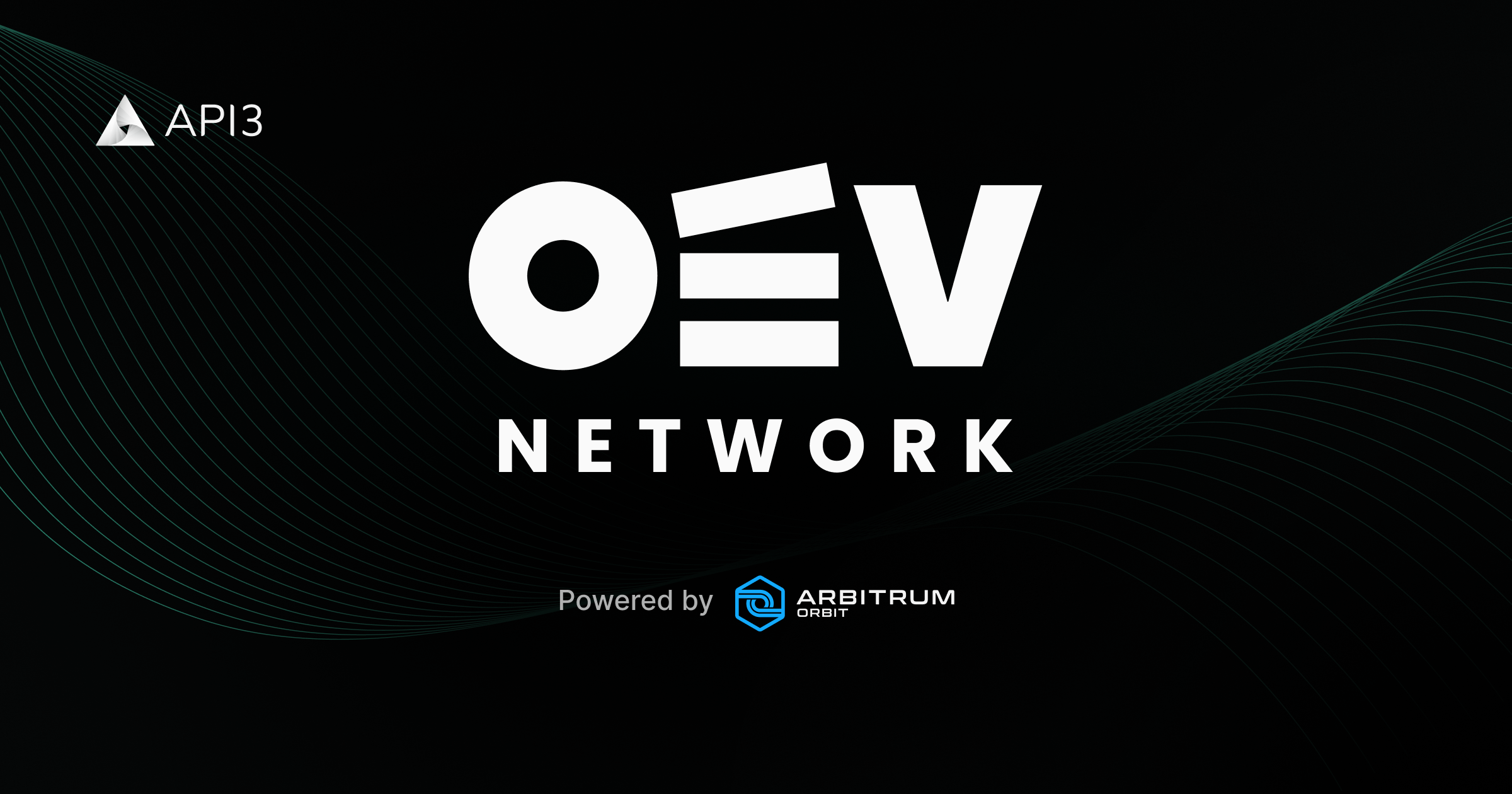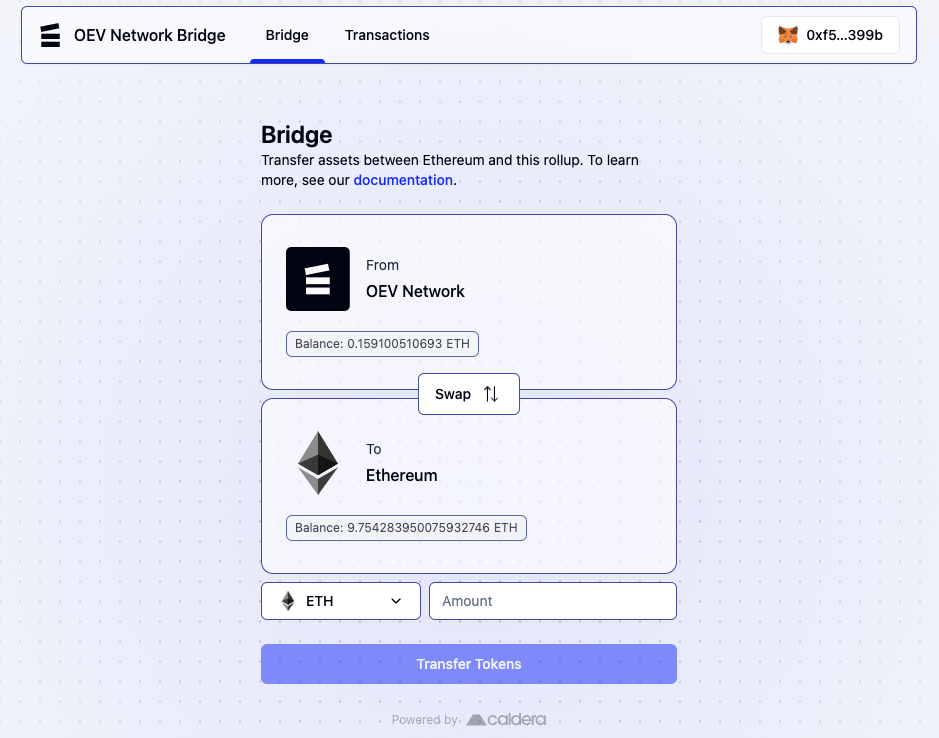 OEV Searchers → In Depth
OEV Searchers → In DepthOEV Network

The OEV Network operates as a standard Arbitrum Nitro L2 optimistic-rollup. The system ensures transparency and allows verification of the auction process. In this marketplace, OEV searchers place bids for the exclusive opportunity to update dAPIs for a short period of time.
By hosting auctions on-chain, we address two big issues:
- Scalability - The OEV network hosts auctions across different dApps across multiple chains. The system needs to scale up with demand, especially during periods of market volatility where the activity is the highest. This is a long-solved problem in blockchains through gas fees.
- Transparency - Auctions are awarded via an off-chain system, called OEV Auctioneer, so it is important to be able to reason about the correctness of auction outcomes. Blockchains are the perfect tool for this, as all the data is public and verifiable.
To participate in auctions, searchers need to have a sufficient amount of ETH bridged to the OEV network and interact with the OevAuctionHouse contract.
Using the OEV Network
The OEV Network can be added as a custom network to an EVM compatible wallet.
| Details | Value |
|---|---|
| Network | OEV Network |
| Chain ID | 4913 |
| RPC URL (HTTP) | https://oev.rpc.api3.org/http |
| RPC URL (WS) | https://oev.rpc.api3.org/ws |
| Symbol | ETH |
| Block Explorer URL | https://oev.explorer.api3.org/ |
| Bridge URL | https://oev.bridge.api3.org/ |
Properties
Here are some of the key properties of the OEV Network:
- Block time - Under high load, the block time of the network can be as fast as 250ms. Note that the OEV Network only produces blocks when there are transactions.
- Gas fees - The gas fees are paid in ETH, and because the network is an optimistic L2 rollup, the gas fees are low.
- Using Anytrust - By using AnyTrust DAC, the OEV Network achieves further cost reduction.
See Arbitrum Nitro details and AnyTrust details for more information.
Bridging ETH
Use the OEV Network bridge to bridge your ETH to the OEV Network. Bridging is only possible from ETH mainnet.

Clicking on Transfer Tokens will automatically add the OEV Network to your Metamask wallet. To bridge, confirm the transaction in your wallet and wait for confirmation. After the transaction is confirmed, you should see your ETH on the OEV Network.
Api3ServerV1
The implementation of the audited Api3ServerV1 contract is publicly available here.
The Api3ServerV1 contract powers dAPIs on the OEV Network, which are used in the OevAuctionHouse contract to compute collateral and protocol fee from the bid amount. Note that this chain is not officially listed on the API3 market because the OEV Network is primarily intended to be used for OEV auctions.
OevAuctionHouse
The implementation of the audited OevAuctionHouse contract is publicly available here.
The OevAuctionHouse contract is a general purpose auction platform designed to work together with an off-chain component (OEV Auctioneer) that auctions off data in a transparent and retrospectively verifiable manner.
To support OEV auctions in the least privileged way, the contract defines a few special roles allowed to interact with the contract in an authorized way. These roles are:
- Proxy setter - This role allows the caller to change the dAPI proxy used for collateral and protocol fee conversion to the native OEV network currency.
- Auctioneer - This role allows the caller to award winning bids, and confirm or contradict fulfillments.
- Withdrawer - This role allows the caller to withdraw the protocol fee and slashed amount collected by the contract.
The interactions with this contract include:
- Searchers depositing collateral
- Searchers withdrawing collateral
- Searchers placing or expediting bids
- Auctioneer resolving auction winner
- Auctioneer confirming or contradicting fulfillment
- API3 DAO updating protocol and collateral fee
- API3 DAO updating the price feed proxies
Tech-savvy users can refer to the contract's source for details.
Depositing Collateral
To be eligible to win OEV auctions, searchers need to have enough collateral deposited in the OevAuctionHouse contract. See bid eligibility section for more details.
We recommend using the same hot wallet for the bot on the OEV network (to participate in auctions) and the target chain (to capture the OEV). To deposit funds, you can use either the deposit or depositForBidder functions. The latter allows you to deposit the collateral on behalf of another address. Both functions are payable and expect a non-zero amount to be sent with the transaction.
function deposit() external payable
returns (uint256 bidderBalance); // The bidder balance that was deposited2
function depositForBidder(
address bidder // The address of the bidder to deposit on behalf of
) external payable returns (uint256 bidderBalance); // The bidder balance that was deposited2
3
For an advanced usage where the bidder is a contract, refer to bidding contract section.
Withdrawing Collateral
Withdrawal of deposited collateral is implemented as a two-way process to prevent denial of service by frontrunning the award transaction by withdrawing the collateral.
To withdraw the deposited collateral from the OevAuctionHouse contract, the searcher needs to do the following:
- Call the
initiateWithdrawalfunction on the OevAuctionHouse contract.
function initiateWithdrawal()
external
returns (uint256 earliestWithdrawalTimestamp); // The timestamp after which the withdrawal can be performed2
3
- Wait for the withdrawal period to pass. The period is 15 seconds.
- Call the
withdrawfunction on the OevAuctionHouse contract. You need to specify the recipient and amount to be withdrawn.
function withdraw(
address payable recipient, // The address of the recipient of the withdrawal
uint256 amount // The amount to be withdrawn
) external;2
3
4
Collateral and Protocol Fee
For a searcher to win an auction, they are required to have enough ETH deposited in the OevAuctionHouse contract. Similarly, the value the searcher can win is limited by the amount they have deposited. Refer to bid eligibility section for details.
The collateral and protocol fee rates are configurable parameters within the OevAuctionHouse contract and are configured by the API3 DAO. These values are set in "basis points", which are 1/100th of a percentage point. For example, a value of 1000 is equivalent to 10%. The current values are set to the following:
| Parameter | Value |
|---|---|
| collateralInBasisPoints | 1000 |
| protocolFeeInBasisPoints | 0 |
The collateral and protocol fee are calculated using the price feed values at the time of the bid placement. However, the collateral is reserved at award time. This allows the bidder to place multiple bids for different dApps, even if their collateral doesn't allow them to win all of them, providing greater flexibility.
If the auction winner pays for the bid on the OEV Network and reports the fulfillment, their collateral is released and the protocol fee is deducted. If the auction winner doesn't pay for the award or fails to report the fulfillment, their collateral is slashed.
Placing a bid
There are two ways to place a bid, either by calling placeBidWithExpiration or by placeBid. The latter is merely a convenience function that places a bid with maximum expiration timestamp.
function placeBidWithExpiration(
bytes32 bidTopic, // The bid topic is an identifier of the auction
uint256 chainId, // The chain ID of the dApp
uint256 bidAmount, // The amount the searcher is willing to pay for the auction
bytes calldata bidDetails, // Bid details according to the off-chain system specification
uint256 maxCollateralAmount, // The maximum collateral amount the searcher is willing to pay
uint256 maxProtocolFeeAmount, // The maximum protocol fee amount the searcher is willing to pay
uint32 expirationTimestamp // The expiration timestamp of the bid
) external returns (
uint104 collateralAmount, // The collateral amount required for the bid
uint104 protocolFeeAmount // The protocol fee required for the bid
);2
3
4
5
6
7
8
9
10
11
12
Or the similar placeBid function:
function placeBid(
bytes32 bidTopic, // The bid topic is an identifier of the auction
uint256 chainId, // The chain ID of the dApp
uint256 bidAmount, // The amount the searcher is willing to pay for the auction
bytes calldata bidDetails, // Bid details according to the off-chain system specification
uint256 maxCollateralAmount, // The maximum collateral amount the searcher is willing to pay
uint256 maxProtocolFeeAmount // The maximum protocol fee amount the searcher is willing to pay
)
external
returns (
uint32 expirationTimestamp, // The timestamp after which the bid becomes expired
uint104 collateralAmount, // The collateral amount required for the bid
uint104 protocolFeeAmount // The protocol fee required for the bid
);2
3
4
5
6
7
8
9
10
11
12
13
14
The OevAuctionHouse contract is designed in a generic way. To fully understand how to use these functions, we need to understand how OEV Auctioneer works. Refer to placing a bid section for more details.
Expediting a bid
Once a bid is placed, it can no longer be cancelled - only expedited. This is to prevent griefing by repeatedly placing a bid and cancelling it shortly after. The contract defines a constant MINIMUM_BID_LIFETIME set to 15 seconds. Searchers can use expediteBidExpiration or expediteBidExpirationMaximally for this purpose.
function expediteBidExpiration(
bytes32 bidTopic, // The bid topic is an identifier of the auction
bytes32 bidDetailsHash, // The keccak256 hash of the bid details
uint32 expirationTimestamp // The new expiration timestamp of the bid
) external;2
3
4
5
or
function expediteBidExpirationMaximally(
bytes32 bidTopic, // The bid topic is an identifier of the auction
bytes32 bidDetailsHash // The keccak256 hash of the bid details
) external returns (uint32 expirationTimestamp); // The updated expiration timestamp of the bid2
3
4
The OevAuctionHouse contract is designed in a generic way. To fully understand how to use these functions, we need to understand how OEV Auctioneer works. Refer to the Expediting a bid section for more details.
Deployed Contracts
These are the relevant contracts deployed on the OEV Network:
| Contract name | Address |
|---|---|
| Api3ServerV1 | 0x709944a48cAf83535e43471680fDA4905FB3920a |
| OevAuctionHouse | 0x34f13A5C0AD750d212267bcBc230c87AEFD35CC5 |

